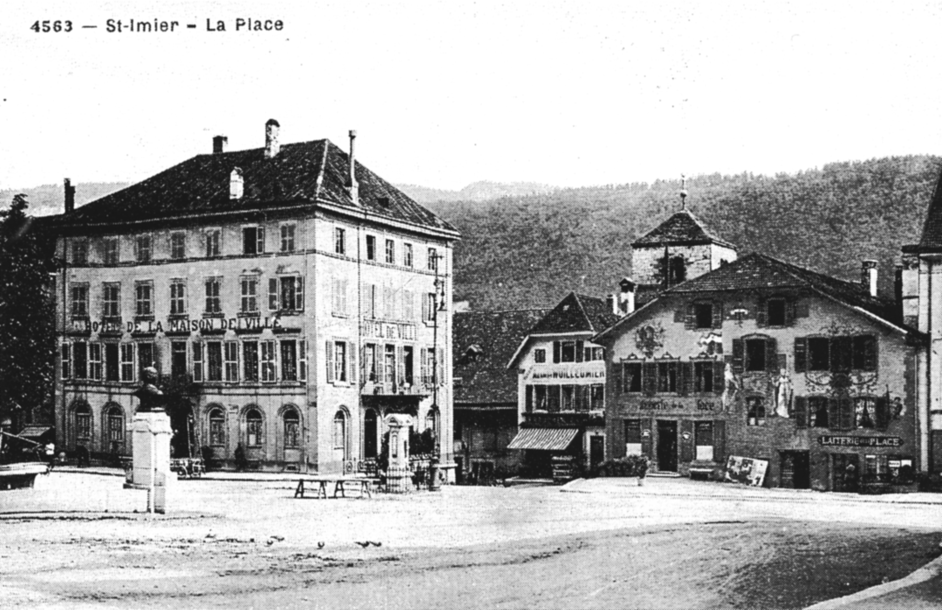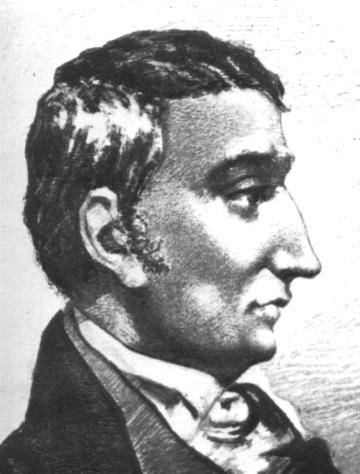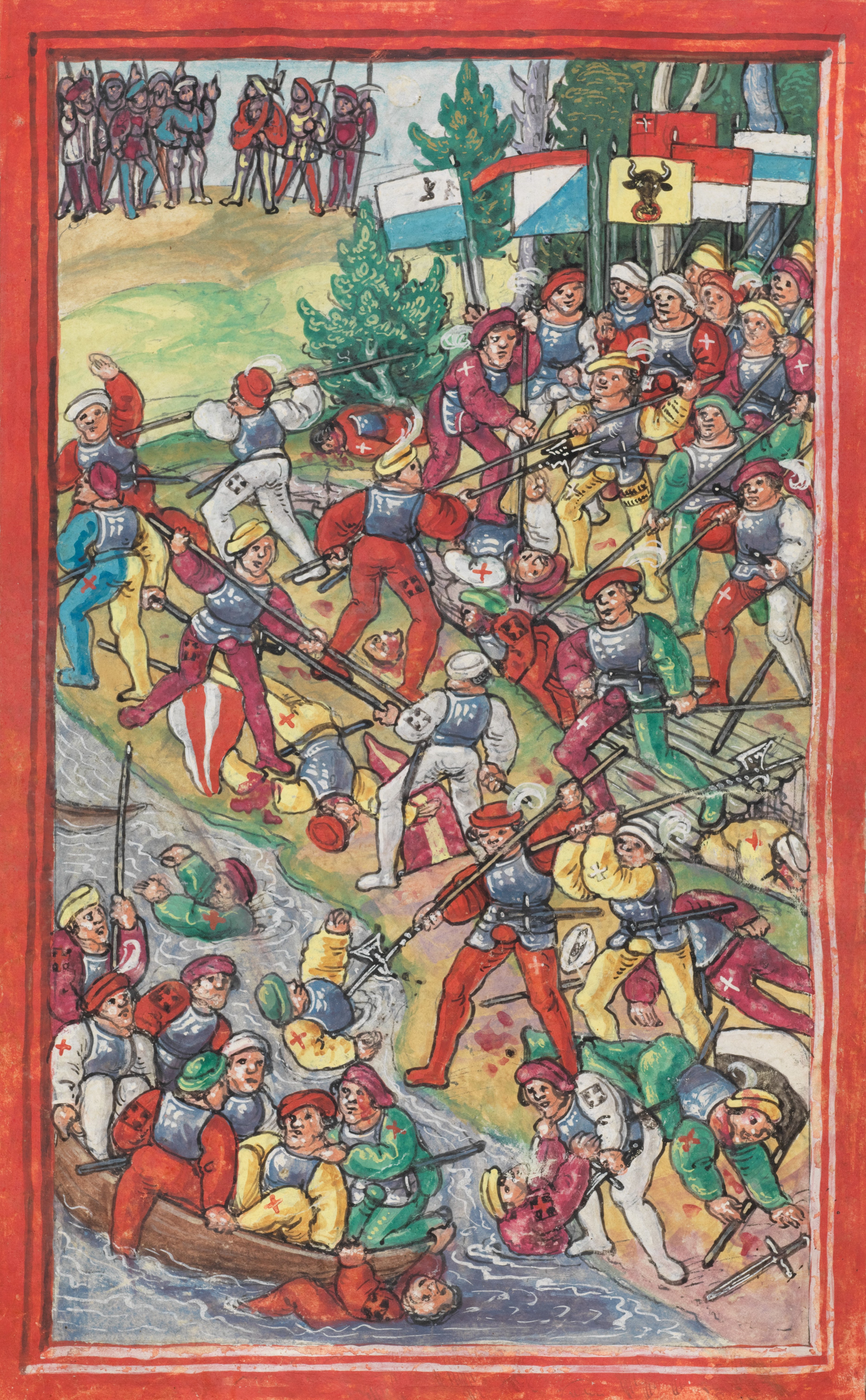|
1872 St. Imier Congress
The St. Imier Congress was a meeting of the Jura Federation and anti-authoritarian apostates of the First International in September 1872. Background Among the ideological debates within the socialist First International, Karl Marx and Mikhail Bakunin disagreed on the revolutionary role of the working class and political struggle. Following the demise of the 1871 Paris Commune, the International debated whether the proletariat should create its own state (Marx's position) or continue making commune attempts (Bakunin's position). Marx arranged 1872 Hague Congress, the International's 1872 Congress in The Hague, the Netherlands, where the Swiss Bakunin could not attend without arrest in Germany or France. The Hague Congress sided with Marx and expelled Bakunin from the International over aspects of his dissent and person, causing a split that would ultimately end the organization. International delegates of the minority opposed to Bakunin's expulsion met early in the Septembe ... [...More Info...] [...Related Items...] OR: [Wikipedia] [Google] [Baidu] |
James Guillaume
James Guillaume (February 16, 1844, London – November 20, 1916, Paris) was a leading member of the Jura federation, the anarchist wing of the First International. Later, Guillaume would take an active role in the founding of the Anarchist St. Imier International. Work In his 1876 essay, "Ideas on Social Organization," Guillaume set forth his opinions regarding the form that society would take in a post-revolutionary world, expressing the collectivist anarchist position he shared with Bakunin and other anti-authoritarians involved in the First International: :Whatever items are produced by collective labor will belong to the community, and each member will receive remuneration for his labor either in the form of commodities (subsistence, supplies, clothing, etc.) or in currency. Only later, he believed, would it be possible to progress to a communist system where distribution will be according to need: :When, thanks to the progress of scientific industry and agriculture, produc ... [...More Info...] [...Related Items...] OR: [Wikipedia] [Google] [Baidu] |
Political Congresses
Politics (from , ) is the set of activities that are associated with making decisions in groups, or other forms of power relations among individuals, such as the distribution of resources or status. The branch of social science that studies politics and government is referred to as political science. It may be used positively in the context of a "political solution" which is compromising and nonviolent, or descriptively as "the art or science of government", but also often carries a negative connotation.. The concept has been defined in various ways, and different approaches have fundamentally differing views on whether it should be used extensively or limitedly, empirically or normatively, and on whether conflict or co-operation is more essential to it. A variety of methods are deployed in politics, which include promoting one's own political views among people, negotiation with other political subjects, making laws, and exercising internal and external force, including wa ... [...More Info...] [...Related Items...] OR: [Wikipedia] [Google] [Baidu] |
International Workingmen's Association
The International Workingmen's Association (IWA), often called the First International (1864–1876), was an international organisation which aimed at uniting a variety of different left-wing socialist, communist and anarchist groups and trade unions that were based on the working class and class struggle. It was founded in 1864 in a workmen's meeting held in St. Martin's Hall, London. Its first congress was held in 1866 in Geneva. In Europe, a period of harsh reaction followed the widespread Revolutions of 1848. The next major phase of revolutionary activity began almost twenty years later with the founding of the IWA in 1864. At its peak, the IWA reported having 8 million members while police reported 5 million. In 1872, it split in two over conflicts between statist and anarchist factions and dissolved in 1876. The Second International was founded in 1889. Origins Following the January Uprising in Poland in 1863, French and British workers started to discuss developing ... [...More Info...] [...Related Items...] OR: [Wikipedia] [Google] [Baidu] |
History Of Socialism
The history of socialism has its origins in the 1789 French Revolution and the changes which it brought, although it has precedents in earlier movements and ideas. ''The Communist Manifesto'' was written by Karl Marx and Friedrich Engels in 1847-48 just before the Revolutions of 1848 swept Europe, expressing what they termed scientific socialism. In the last third of the 19th century parties dedicated to Democratic socialism arose in Europe, drawing mainly from Marxism. The Australian Labor Party was the world's first elected socialist party when it formed government in the Colony of Queensland for a week in 1899. In the first half of the 20th century, the Soviet Union and the Communist party, communist parties of the Third International around the world mainly came to represent socialism in terms of the Economy of the Soviet Union, Soviet model of economic development and the creation of Planned economy, centrally planned economies directed by a state that owns all the means of pr ... [...More Info...] [...Related Items...] OR: [Wikipedia] [Google] [Baidu] |
History Of Anarchism
The history of anarchism is as ambiguous as anarchism itself. Scholars find it hard to define or agree on what anarchism means, which makes outlining its history difficult. There is a range of views on anarchism and its history. Some feel anarchism is a distinct, well-defined 19th and 20th century movement while others identify anarchist traits long before first civilisations existed. Prehistoric society existed without formal hierarchies, which some anthropologists have described as similar to Outline of anarchism, anarchism. The first traces of formal anarchist thought can be found in ancient Greece and Ancient China, China, where numerous philosophers questioned the necessity of the State (polity), state and declared the moral right of the individual to live free from coercion. During the Middle Ages, some religious sects espoused libertarian thought, and the Age of Enlightenment, and the attendant rise of rationalism and science signalled the birth of the modern anarchist mo ... [...More Info...] [...Related Items...] OR: [Wikipedia] [Google] [Baidu] |
Anarchism In Switzerland
Anarchism in Switzerland appeared, as a political current, within the Jura Federation of the International Workingmen's Association (IWA), under the influence of Mikhail Bakunin and Swiss libertarian activists such as James Guillaume and Adhémar Schwitzguébel. Swiss anarchism subsequently evolved alongside the nascent social democratic movement and participated in the local opposition to fascism during the interwar period. The contemporary Swiss anarchist movement then grew into a number of militant groups, libertarian socialist organizations and squats. History In August 1291, an alliance was formed between the cantons of Uri, Schwyz and Unterwalden, establishing the Swiss Confederacy with imperial immediacy, which allowed for the territory's autonomy from the Holy Roman Empire. During the growth of the Old Swiss Confederacy throughout the 14th and 15th centuries, it continued to assert its autonomy through a number of conflicts against noble houses such as the Habsburgs and the ... [...More Info...] [...Related Items...] OR: [Wikipedia] [Google] [Baidu] |
1872 In Politics
Year 187 ( CLXXXVII) was a common year starting on Sunday (link will display the full calendar) of the Julian calendar. At the time, it was known as the Year of the Consulship of Quintius and Aelianus (or, less frequently, year 940 ''Ab urbe condita''). The denomination 187 for this year has been used since the early medieval period, when the Anno Domini calendar era became the prevalent method in Europe for naming years. Events By place Roman Empire * Septimius Severus marries Julia Domna (age 17), a Syrian princess, at Lugdunum (modern-day Lyon). She is the youngest daughter of high-priest Julius Bassianus – a descendant of the Royal House of Emesa. Her elder sister is Julia Maesa. * Clodius Albinus defeats the Chatti, a highly organized German tribe that controlled the area that includes the Black Forest. By topic Religion * Olympianus succeeds Pertinax as bishop of Byzantium (until 198). Births * Cao Pi, Chinese emperor of the Cao Wei state (d. 226) * Gu ... [...More Info...] [...Related Items...] OR: [Wikipedia] [Google] [Baidu] |
1872 Conferences
Year 187 ( CLXXXVII) was a common year starting on Sunday (link will display the full calendar) of the Julian calendar. At the time, it was known as the Year of the Consulship of Quintius and Aelianus (or, less frequently, year 940 ''Ab urbe condita''). The denomination 187 for this year has been used since the early medieval period, when the Anno Domini calendar era became the prevalent method in Europe for naming years. Events By place Roman Empire * Septimius Severus marries Julia Domna (age 17), a Syrian princess, at Lugdunum (modern-day Lyon). She is the youngest daughter of high-priest Julius Bassianus – a descendant of the Royal House of Emesa. Her elder sister is Julia Maesa. * Clodius Albinus defeats the Chatti, a highly organized German tribe that controlled the area that includes the Black Forest. By topic Religion * Olympianus succeeds Pertinax as bishop of Byzantium (until 198). Births * Cao Pi, Chinese emperor of the Cao Wei state (d. 226) * Gu ... [...More Info...] [...Related Items...] OR: [Wikipedia] [Google] [Baidu] |
Gustave Lefrançais
Gustave Adolphe Lefrançais (1826–1901) was a Communard and member of the First International and Jura Federation The Jura Federation represented the anarchist, Bakuninist faction of the First International during the anti-statist split from the organization. Jura, a Swiss area, was known for its watchmaker artisans in La Chaux-de-Fonds, who shared anti- .... References 1826 births 1901 deaths People from Angers Members of the International Workingmen's Association Burials at Père Lachaise Cemetery Communards French socialists Jura Federation {{socialist-stub ... [...More Info...] [...Related Items...] OR: [Wikipedia] [Google] [Baidu] |
Tomás González Morago
Tomás González Morago (n/a-1885) was a notable Spanish anarchist. Morago, who was an engraver, was also a prominent member of the labor organization Primera Internacional in Spain. Accounts cite him as the first and greatest of the Spanish anarchist movement. Biography González Morago was the son of a Carlist in Andalusia. He became drawn to anarchism due to his religious beliefs. In his view, it realized the teachings of the Gospel. He is recognized for possessing brilliant qualities, prompting peers such as Ericco Malatesta to call him as the greatest Spanish anarchist. However, he was described as unstable, spending days in bed with bouts of depression. Court documents showed that he was imprisoned by a district court in 1884 for forging bank notes. González Morago died as a young man in a Granada prison in 1885. An account stated that cholera was the cause of his death. Works In Madrid, González Morago owned an engraving shop, which also served as location for po ... [...More Info...] [...Related Items...] OR: [Wikipedia] [Google] [Baidu] |
Nicolás Alonso Marselau
Nicolas or Nicolás may refer to: People Given name * Nicolas (given name) Mononym * Nicolas (footballer, born 1999), Brazilian footballer * Nicolas (footballer, born 2000), Brazilian footballer Surname Nicolas * Dafydd Nicolas (c.1705–1774), Welsh poet * Jean Nicolas (1913–1978), French international football player * Nicholas Harris Nicolas (1799–1848), English antiquary * Paul Nicolas (1899–1959), French international football player * Robert Nicolas (1595–1667), English politician Nicolás * Adolfo Nicolás (1936–2020), Superior General of the Society of Jesus * Eduardo Nicolás (born 1972), Spanish former professional tennis player Other uses * Nicolas (wine retailer), a French chain of wine retailers * ''Le Petit Nicolas'', a series of children's books by René Goscinny See also * San Nicolás (other) * Nicholas (other) * Nicola (other) * Nikola Nikola () is a given name which, like Nicholas, is a version of the Greek ''Nikolaos ... [...More Info...] [...Related Items...] OR: [Wikipedia] [Google] [Baidu] |





